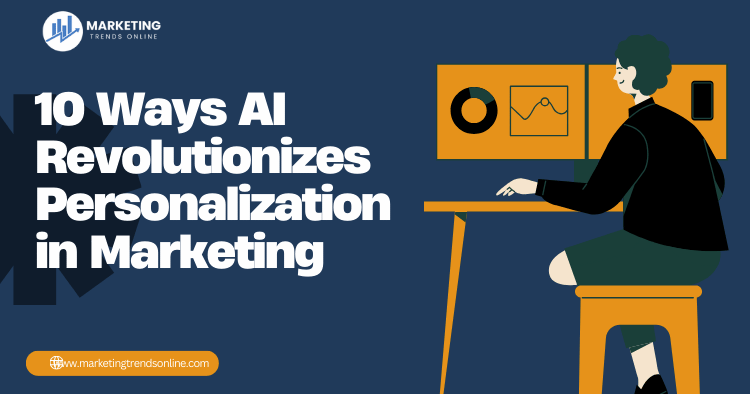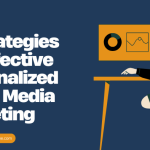Table of Contents
- Introduction
- 1. Enhanced Customer Segmentation
- 2. Predictive Analytics
- 3. Dynamic Content Creation
- 4. Chatbots and Virtual Assistants
- 5. Personalized Email Marketing
- 6. Behavioral Targeting
- 7. Improved Customer Experience
- 8. Recommendation Systems
- 9. Sentiment Analysis
- 10. Real-Time Personalization
- Conclusion
Introduction
In the bustling world of digital marketing, personalization has emerged as a cornerstone for effective customer engagement. Enter Artificial Intelligence (AI), a game-changer that allows brands to tailor experiences to individual preferences like never before. This article explores ten ways AI is revolutionizing personalization in marketing, elevating customer interactions, and driving business success.
1. Enhanced Customer Segmentation
Gone are the days of generic marketing strategies. AI empowers businesses to segment their audience more effectively by analyzing vast amounts of data. Using machine learning algorithms, companies can identify unique customer characteristics, behaviors, and preferences.
Example: A retail brand might segment its customers based on shopping history, geographic location, and even social media activity. This refined segmentation allows for targeted campaigns that resonate with each group, leading to higher conversion rates.
For more insights, see Top 7 Content Personalization Trends 2024-2025.
2. Predictive Analytics
Predictive analytics harnesses AI to forecast future customer behavior based on historical data. By analyzing patterns, businesses can predict what products a customer is likely to buy next, enabling proactive marketing strategies.
FAQ: How does predictive analytics improve sales?
– By anticipating customer needs, businesses can recommend products before customers even realize they want them, enhancing the likelihood of a purchase.
Visual Element:
Historical Data Predictive Insight Previous purchases Likely future purchases Browsing behavior Interests for targeted ads Customer feedback Areas for product improvement
3. Dynamic Content Creation
AI can generate personalized content tailored to individual user preferences. This technology analyzes user data in real time to display the most relevant content, whether it’s articles, videos, or product recommendations.
Example: A news website might show different articles based on a reader’s previous interests, ensuring that users engage with content that matters to them.
Also look for Top 7 Long-Form Content Trends 2024 for more on this topic.
4. Chatbots and Virtual Assistants
AI-powered chatbots provide immediate, personalized responses to customer inquiries. They can learn from interactions and improve their responses over time, creating a more engaging user experience.
FAQ: How do chatbots enhance personalization?
– Chatbots can remember previous conversations, allowing them to tailor their responses and recommendations based on past interactions.
5. Personalized Email Marketing
AI takes email marketing to the next level by analyzing user data to craft personalized messages. This can include tailored content, personalized subject lines, and optimized send times.
Example: An e-commerce site might send personalized product recommendations based on past purchases, increasing the chances of re-engagement.
Visual Element:
Personalization Element Impact on Open Rates Personalized subject lines +26% Tailored content +18% Optimal send times +20%
(Source: Mailchimp)
For more on personalized email strategies, check out Top 7 Email Automation Trends Shaping 2024 Success.
6. Behavioral Targeting
AI analyzes user behavior across multiple channels to deliver targeted advertisements that align with user interests. This strategy enhances ad relevance, resulting in higher click-through rates.
Example: A user browsing travel websites may see ads for flight deals or hotel discounts on social media, tailored to their recent searches.
7. Improved Customer Experience
AI enhances the overall customer experience by providing personalized recommendations and support. From product suggestions to tailored customer service, AI helps create a seamless journey.
FAQ: How does AI improve customer satisfaction?
– By accurately predicting customer needs and providing timely solutions, AI fosters a more satisfying and efficient shopping experience.
Explore more on this topic in 10 Proven Strategies to Boost Your Content Marketing ROI.
8. Recommendation Systems
AI-driven recommendation systems analyze user behavior to suggest products or services that align with individual preferences. This technology is widely used in platforms like Netflix and Amazon.
Example: When you finish watching a movie on Netflix, the platform suggests similar films based on your viewing history, keeping you engaged.
9. Sentiment Analysis
Using natural language processing (NLP), AI can analyze customer feedback and social media interactions to gauge sentiment. This insight helps brands understand customer perceptions and adapt their strategies accordingly.
FAQ: What role does sentiment analysis play in marketing?
– By understanding customer sentiment, brands can tailor their messaging and improve their products or services based on feedback.
10. Real-Time Personalization
AI allows for real-time personalization, adapting content and recommendations based on user interactions as they happen. This immediate responsiveness ensures that marketing efforts align closely with user behavior.
Example: If a user adds a product to their cart but doesn’t complete the purchase, a brand might send an email reminder with a discount code, encouraging conversion. For further insights on this, refer to Top 7 Content Marketing Challenges to Overcome in 2024.
Conclusion
AI is revolutionizing the way businesses approach personalization in marketing. By leveraging advanced technologies for customer segmentation, predictive analytics, and real-time insights, brands can create meaningful connections with their audience. As AI continues to evolve, the potential for personalization will only grow, allowing marketers to craft experiences that truly resonate with consumers. Embrace the future of marketing today and transform your customer relationships for the better!
For further reading on AI and personalization in marketing, check out McKinsey’s insights on AI and Harvard Business Review’s take on personalized marketing.
Feel free to ask if you have any questions or need more information!





